Wrecks, reefs, turtles and rays? The Caribbean is a magnet for divers and snorkellers, so get your fins on, writes Jo Cooke.
Like this and want more details? Click here to download and save as a PDF.
With warm waters, good visibility and gentle trade winds, the West Indies has all the ingredients for a perfect day under the ocean waves.
Here’s our guide to some of the region’s hotspots for first-timers, seasoned scuba enthusiasts or those who just like to look at pretty fish in the shallows.
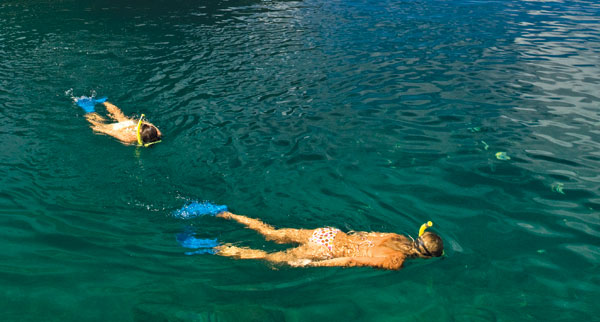
It’s a shore thing
There’s no need to get yourself into deep water to see the huge variety of species that thrive in the West Indies – just pick a resort where the action starts at the beach. Sugar Beach in Saint Lucia is a peachy choice for those who want to introduce their children to marine life or for folk who aren’t strong swimmers. Set beneath the towering tree clad cones of the Piton peaks, the hotel provides snorkel gear for guests. Head to the north end of the beach and swim out alongside the cliff and within metres you could be surrounded by the likes of sergeant major, bar jack and butterfly fish.
Alternatively, the thriving sea grass beds beneath the gently lapping waves of Rosewood Little Dix Bay in Virgin Gorda in the BVI attract larger residents – turtles. Swim a few strokes off shore then float face down with your snorkel and you can watch these loveable reptiles feed. Morning and afternoon is when they’re at their most active.
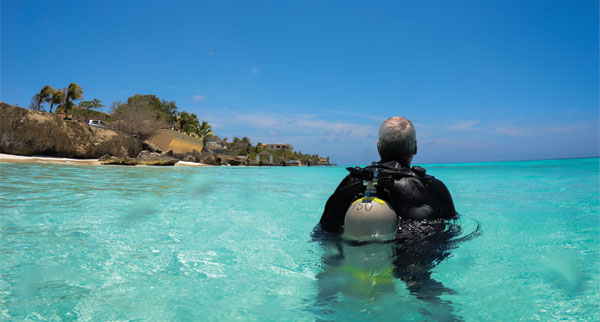
Bonaire, meanwhile, has more than 80 dive sites, many of which can be accessed from the shoreline, making this pint-sized island a great choice for snorkellers and divers alike. A marine park protects 26 square miles of ocean around Bonaire, giving it some of the clearest, best-stocked waters in the region. Here you could bump into seahorses, octopuses and parrot fish as well as sea anemones in a kaleidoscope of colours. There’s also the opportunity to snorkel through the island’s mangroves, which serve as a nursery for juvenile fish, giving you the chance to see hundreds of minnows in the narrow channels.
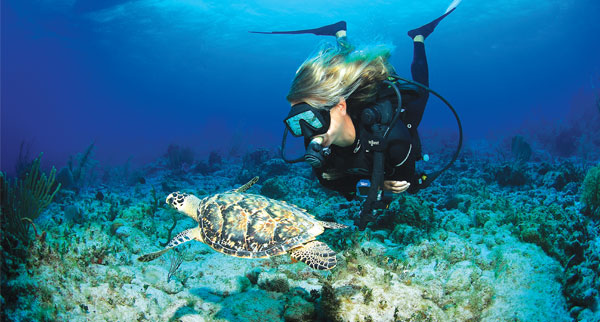
Cat got the cream
With equipment provided, and expert guides to lead you to all the nooks and crannies where the shyest sea creatures hang out, signing up for a catamaran snorkel cruise is a no-brainer for those who want a lesson in marine biology. Two of the most memorable sailings in the Caribbean are to Tobago Cays in St Vincent and the Grenadines, where the lagoon-like waters are home to starfish, lobster, conch and three species of turtle, and Grand Cayman’s Stingray City. At the latter, you’ll arrive at a sand bank frequented by, you’ve guessed it, hundreds of stingrays that swim around your feet as you stand waist deep in the still waters.
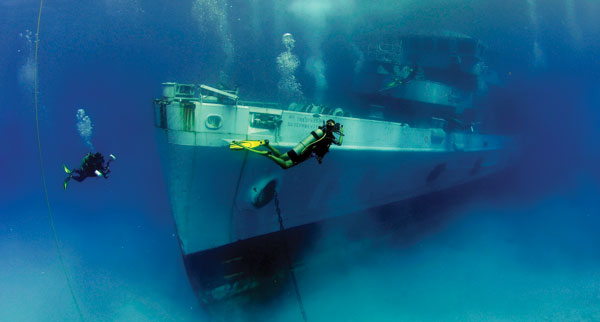
Wreck creation
For experienced divers there is often nothing as thrilling as descending deep into the bowels of a sunken ship, then finding your way through the corridors and engine room, bridge and crew quarters. These vessels generally also become an artificial reef attracting coral, urchin or sea squirt that in turn lure fish. It’s two for the price of one, then: the chance to see a hidden piece of maritime history and to share the experience with a passing barracuda, reef or nurse shark. Justifiably popular wreck dives include the USS Kittiwake, a former submarine rescue ship that is a short boat ride from the glorious Seven Mile beach in Grand Cayman, and the SS Antilla in Aruba, a German cargo ship that was sunk in the Second World War and is one of the largest shipwrecks in the West Indies. Both dives are around 60ft. Snorkellers can also get a look in, as the outlines of these vessels are visible from the surface on calm days.
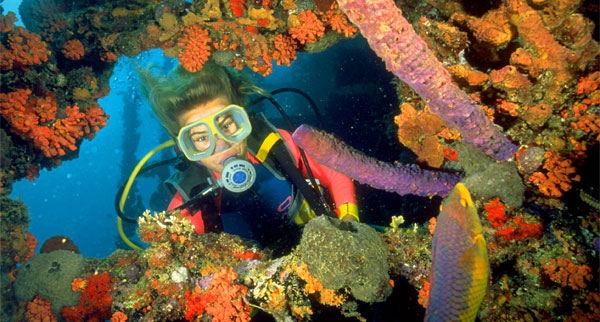
Wall to wall excitement
Those who love wall dives – seemingly flat reefs that make a sudden, sheer drop into deeper, darker waters – could head to Andros in the Bahamas, West Caicos in the Turks and Caicos, or Grand Cayman. The last of these steals the crown for this type of diving. Geologically, Grand Cayman is actually the top of a submerged mountain. It sits in some of the deepest waters in the Caribbean and is surrounded by coral reefs. This creates spectacular walls on all four sides of the landmass. The North Wall has some of the steepest drop-offs, while the West Wall usually has the calmest waters, making it perfect for beginners. Expect to see tunnels, caverns and iridescent coral valleys, plus turtles, eagle rays, reef sharks, giant elephant-ear sponges and sea fans.
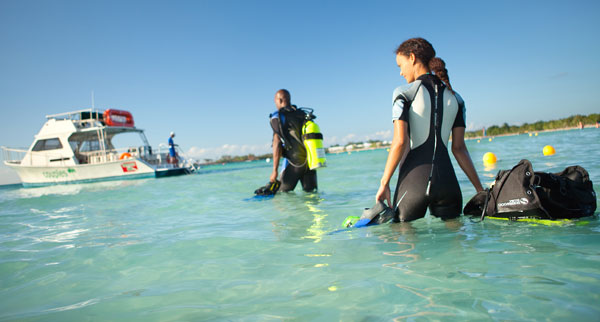
Free diving
Scuba can be an expensive hobby, and also pricey to learn, but not if you’re a smart cookie and book an all-inclusive brand that caters to divers. Both Couples Resorts in Jamaica and Sandals properties across the Caribbean, including those in Antigua, Barbados, the Bahamas and Grenada, have qualified instructors who can get you trained to Padi (Professional Association of Diving Instructors) standard for a very reasonable fee; they also offer unlimited dives in the holiday price for those who are already qualified. If you take full advantage of their dive programmes you can virtually save the price of your stay, compared with paying for the same number of dives off resort.
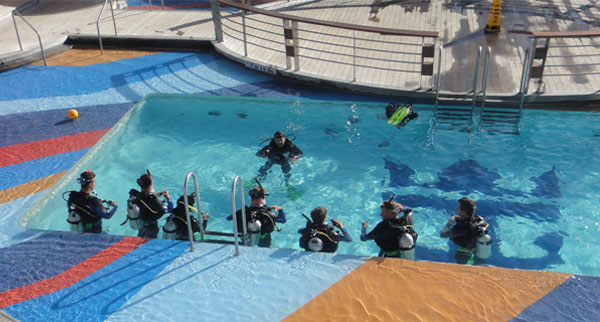
No landlubbers here
Royal Caribbean International has recently added onboard Padi Dive Centres to 10 ships in its fleet, offering Padi training and a full scuba programme. Among the dive sites featured is the Belize Barrier Reef. Passengers can also test the water by booking a 30-minute ‘Try Dive’.
If nothing less than having your own crew will do, The Moorings offers private yacht charters with all the bells and whistles. Your crew is made up of a captain, chef and host, and snorkelling equipment, fishing gear, kayaks and stand-up paddleboards are provided. The skipper sails between alluring, out-of-the-way snorkel sites; close to Puerto Rico, for example, there’s La Parguera, a bioluminescent bay where the water glows at your touch, and Caja de Muertos, an uninhabited island nature reserve where the reef is teeming with tropical fish including wrasse and angel fish.
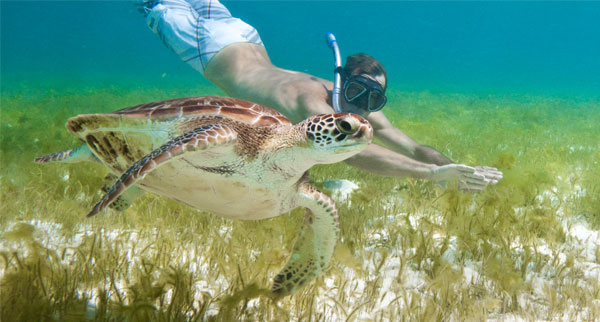
The Moorings is part of Travelopia, and offers commission. Prices for seven nights’ all-inclusive start from £2,314 in early March based on six sharing a catamaran with three en-suite cabins.
Sample product
Kuoni offers seven nights’ all-inclusive at Couples Negril, Jamaica, in a deluxe garden room from £2,811 based on two sharing. The price includes Virgin Atlantic flights from Gatwick and transfers in resort for departures in September.
kuoni.co.uk
Dive Worldwide offers an East End Explorer package in Grand Cayman at Compass Point Dive Resort from £2,275 based on two sharing. The price includes flights, seven nights’ B&B, car hire, 12 dives, tanks and weights. On-site Padi-certified dive centre Ocean Frontiers offers a comprehensive range of courses and four daily boat trips to 55 sites, including wall dives and the Kittiwake wreck.
diveworldwide.com




